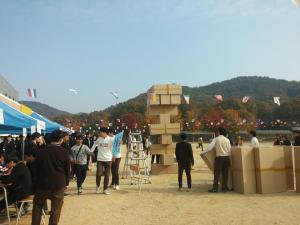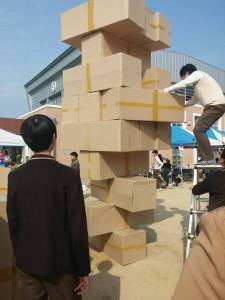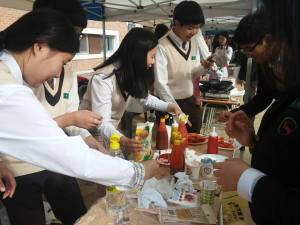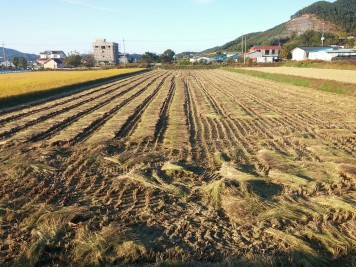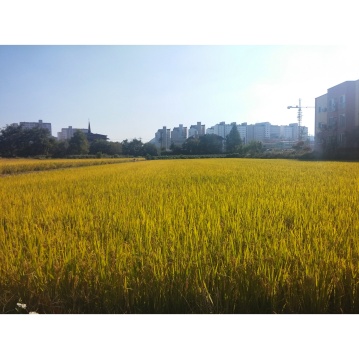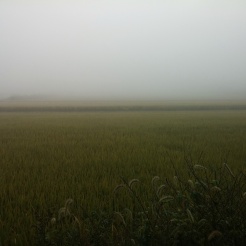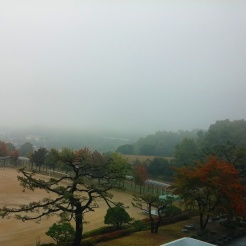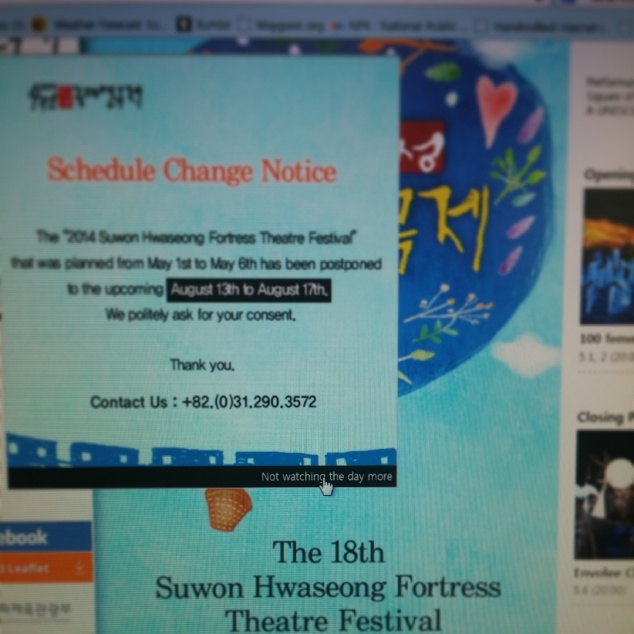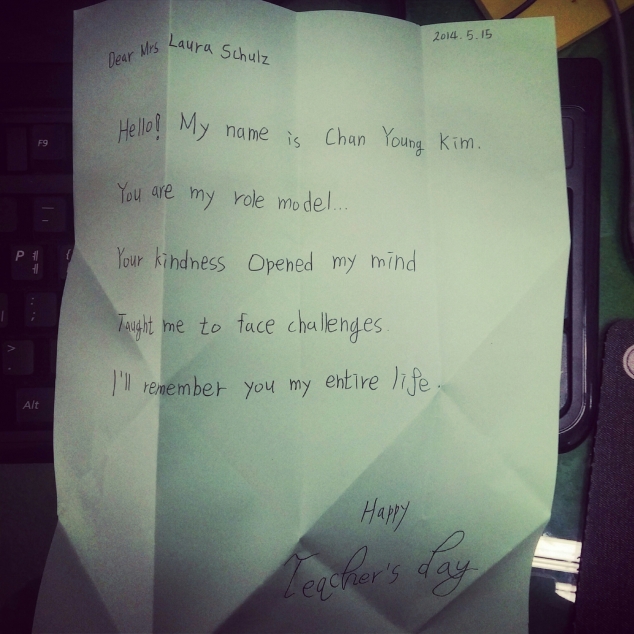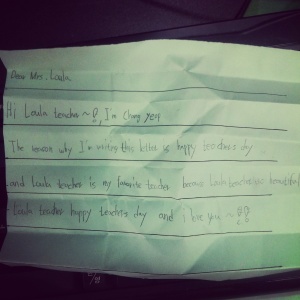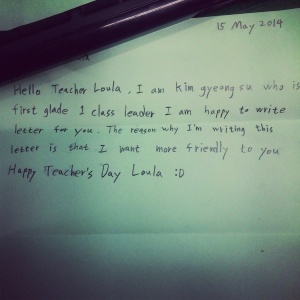Winter vacation, and my last weeks in Korea, have arrived! Winter vacation, in fact, is over. But it’s been a truly good one. I spent a week at home getting some things together and spending time with friends, and then headed out to Jeju Island.
Throughout the past couple of years, whenever I’ve asked my Korean friends for places to go or things to see in Korea, Jeju is nearly always the first place they’ll say. Most people go in summer, when its nickname “the Hawaii of Korea” rings most true, but I was all about the lack of crowds and cold January air. My vacation dates didn’t line up well with my friends’ (…um, that is, the one friend I have :P), so I booked a flight and went solo.
Traveling alone can be kind of, like, a bummer. There’s no one to share your experiences with, and eating or going out alone can be lame, if not downright awkward. Even though I generally enjoy doing things by myself, I was a little worried I’d end up feeling disappointed.
But, as it turns out—I loved it.
I liked doing everything I wanted to do, when I wanted to do it. I liked taking unscheduled detours. I liked how new discoveries felt so significant and personal. I liked navigating the island, and being good at it. (On the flipside, I liked not annoying anyone when I got lost!) And, to be completely honest… I liked being able to go back to my room at 7pm to drink tea and watch TV. (No judgment.)
But despite all these awesome things, the fact remains that I didn’t get to share it with anyone as it happened, and so I feel a blog post is most definitely in order. Without further ado: Jeju.
I arrived on a Sunday night; my hostel was nothing special (except perhaps especially old and flourescent light-y), but it was clean, had hot water, free tangerines, and this rooftop:
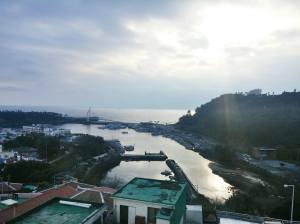
I basically had two goals for Jeju: 1. To hike a trail on Hallasan, and 2. To see the beautiful Seongsan Ilchulbong, a crater on the coast.
First, some background on Jeju. It’s a volcanic island with the central volcano, Hallasan, rising high above all the smaller volcanic rocks. You can see Hallasan, which is also Korea’s tallest mountain, from anywhere on the island–or at least, you can see where it disappears into the clouds. Jeju’s history and a traditional culture are very distinct from mainland Korea, but now, it seems, a lot of the culture’s been lost. I’ve seen articles recently where long-time residents of Jeju express sadness and anger at the changes. They’ve watched the peculiar language of Jeju disappear almost completely from use, and they’ve seen farms and villages become TV sets or resorts or summer homes for the rich. But despite the potential for nostalgia or indignation towards evil money-driven developers–what I felt on Jeju was just pleasure in its amazing, but somehow unobtrusive beauty. (Except Hallasan. Hallasan is obtrusive.) I loved seeing the small tangerine farms and fishing villages and crazy rock formations everywhere I went.
Anyway. Goal No. 1: Hike Hallasan.
After reminding myself that I am not actually the super fit hiker girl I would like to be, I decided to keep to a couple of the easier trails, rather than the 9km+ stretch up to the top. The views were still outstanding, and the hike, while short, wasn’t so easy as to feel like a cop-out. I woke up around 6am on Monday morning and headed out. There were quite a few of us all waiting at the bus stop to head to the mountain—3 Korean high schoolers, a couple of ajusshis, and a Chinese grad student with his parents. The Chinese student spoke English fluently; at one point he was helping out some Chinese tourists, moving easily back and forth between Chinese, Korean, and English. Ahhh, my jealousy of people who speak multiple languages is intense! (Maybe one day it will spur me on to actually learn another language…?)
When we finally got to the trailhead we saw the usual Korean hiking groups decked out in their brightly colored coats, fancy pole stick things, and hiking boots with crampons. I at least had the crampons.
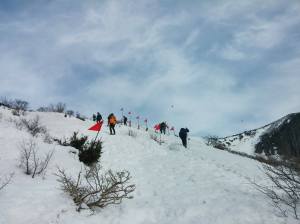 There’s something about being out in the snow that makes me so happy… I can’t really explain it. It’s just invigorating. The weather was nearly perfect—cold but a little sunny. The first few kilometers were nice and easy, walking through a sparse forest. But after maybe an hour I got to the “ridge,” and things became beautiful and windy and steep—and made me super glad for the mini-ice-picks on my shoes.
There’s something about being out in the snow that makes me so happy… I can’t really explain it. It’s just invigorating. The weather was nearly perfect—cold but a little sunny. The first few kilometers were nice and easy, walking through a sparse forest. But after maybe an hour I got to the “ridge,” and things became beautiful and windy and steep—and made me super glad for the mini-ice-picks on my shoes.
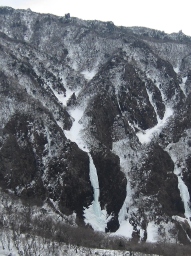
One of the cooler sights along the ridge was that frozen / weirdly broken waterfall in the distance.
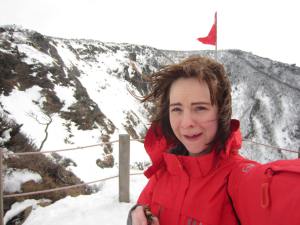
It was kinda windy.
As the ridge began to even out, I met a gentleman on the trail who I will call Mr. Friendly, because he was super friendly (and I never got his name). He was an older guy who would greet literally every person on the trail. This struck me because Koreans usually keep to their own little groups; they’re not exactly quick to make small talk with people they don’t know. But Mr. Friendly would greet everyone he met with gusto, encouraging those who were going slowly, commenting on the beautiful weather, or kindly reminding folks not to wander beyond the trail boundaries. He kind of seemed like he had designated himself The Official Representative of the Mountain. I asked him later if he lived in Jeju and he said, “Of course, this is my daily exercise.”
Mr. Friendly was hiking behind me for a while and talking to me, but I didn’t really understand what he was saying, so I would laugh politely and forge ahead. Eventually he realized I was a foreigner, which delighted him. Except–he couldn’t figure out what I was. “Korean-American?” He asked. Nope, just American, I said. “Chinese?” Not chinese, no. A few minutes later, “Filippino?” Sorry, sir. Apparently my answer of “American” was not sufficient to throw him off the Asian trail (has living in Korea for two years made me look Asian or something?), so I finally said, “My grandfather was German.” Again, delight! “Ah, german! So you have been to the Alps!” Sigh, no, not yet. “But you are German! You must go!” Preaching to the choir, Mr. Friendly.
We’d been walking along pretty flat ground for a while; it was covered in short, wind-stunted, snow-laden evergreen trees and bushes. I tried to think of ways to describe it as I was walking, but “winter wonderland” was the only unfortunate phrase that came to mind. I guess “frozen tundra” could also apply.

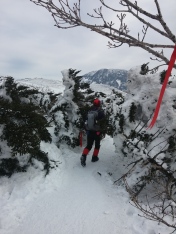
We came out, eventually, to quite a sight. Almost no shrubbery, only snow, snow, snow, the crater in the distance, and a prism-like sky–tiny, crushed clouds with the sun peaking through. I stopped to take app roximately 1 million pictures, which barely do it justice. Expansively white, eerily quiet even with all the hikers around, and a streaky blue crater rock rising straight ahead.
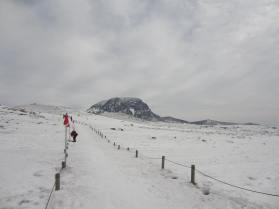
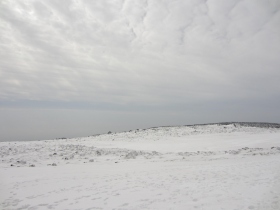
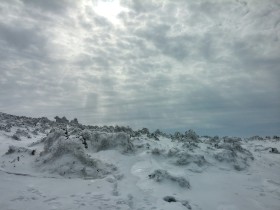
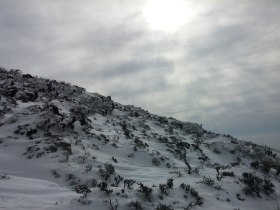
It seemed kind of like the moon.
Mr. Friendly had taken a liking to me, apparently, because he waited for me to catch up, and tried to explain some of the mountain’s history. (At least I think that’s what it was… But my Korean’s not exactly at “volcanic formation” level yet.) It wasn’t too much longer before I’d realized we’d reached the top of the trail–I was actually a little disappointed it had ended. But luckily, the little houses that mark the end of the trail are filled with old ladies selling ramen, and Mr. Friendly insisted on buying mine (and giving me a juice box, and kimbap, and french vanilla cappuccino). We slurped in companionable silence.
As we went back outside, he said, “I think we should break up,” which sounds as funny in Korean as it does in English. He laughed and pointed to a small trail that led farther up, but I was taking a different trail down in the opposite direction. Well, it was lovely, Mr. Friendly. Best of luck out there.
The trail down went by much more quickly (funny how that works), mostly through forest. I did pass a couple of hikers who stopped, gave me a bag of trail mix, and moved on. (Sometimes in Korea I remember that phrase “Don’t take food from strangers.” Then I laugh and take all the food.)
The rest of my day was spent lazily wandering the streets around my hostel, enjoying my rooftop, eating mandu and fried rice, and generally basking in the glow of tired muscles and a full stomach.
Geesh, that was only Day 1. If there is a Jeju, part 2 (which hopefully there will be), it will be shorter!












